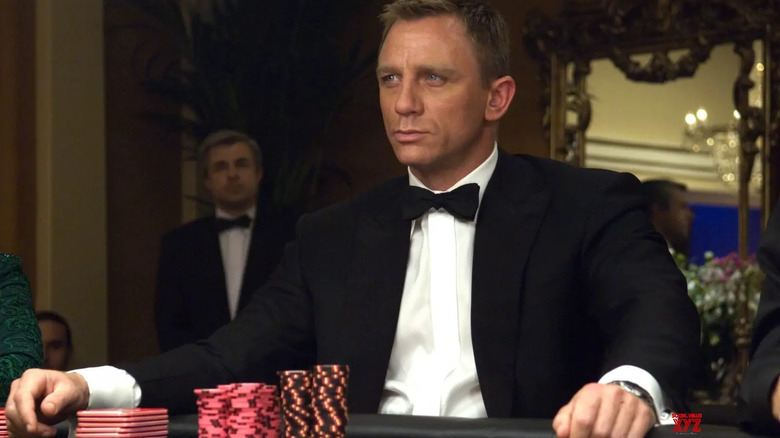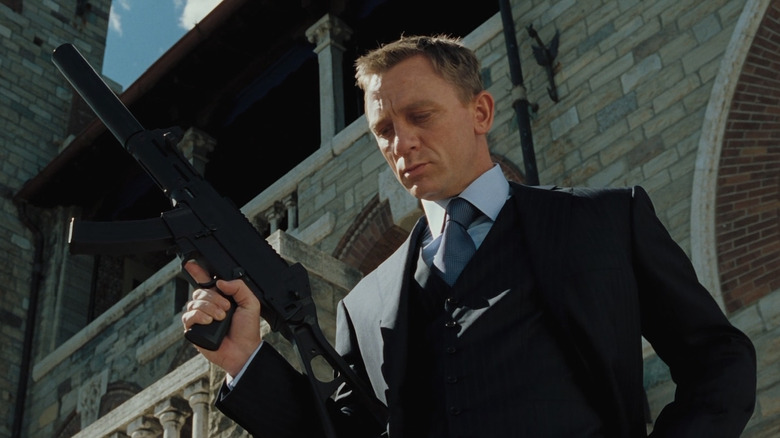James Bond Was Created To Counter Some Real Life Anxiety
We may receive a commission on purchases made from links.
There is a rather unfortunate trend in American wedding decoration that seemingly excoriates the institution in the minds of grooms everywhere. One can see it at party supply shops everywhere: decor for brides is beatific, romantic, and joyous, while decor for grooms is panicked or prison-related. I cannot tell you how much wedding garb out there depicts a frowning groom standing next to his bride, along with the phrase "GAME OVER." Or how many wedding cake toppers feature a groom trying desperately to flee the scene. The implication is that women are very keen to be wed while men would prefer not to be.
These pieces of crass merchandise, at the very least, do reveal a deep, abiding anxiety certain men may feel about long-term relationships. Fiction has long assured us that weddings typically come at the end of stories — all of Shakespeare's comedies end with at least one marriage — perhaps leading some to see "happily ever after" as a terminal condition. The "fun" part of the story all happens before the wedding. One can also look to the "Hangover" movies as another example. Those films are about overgrown boy-men who want to keep the sexy, drunken parties going up until the last minute before womankind begins to interrupt their hedonistic idyll with marriage.
It seems that James Bond was a character born of this groomly anxiety. Bond's creator, author Ian Fleming, revealed in a 1952 letter — printed in the 2015 volume "The Man With the Golden Typewriter: Ian Fleming's James Bond Letters" — that he was inspired to write a sexy, ultra-masculine spy story to shake off a massive case of pre-wedding jitters.
Killing fish in Jamaica
Fleming married his wife Ann in 1952, the same year the first James Bond novel, "Casino Royale," was published. Fleming was 44 years old and had been living on a tropical island fishing and generally living a bachelor's dream. Fleming's love for Ann was clearly enough for him to give up bachelorhood, although he admitted in a letter that it wasn't going to be an easy shift for him. One might say that he needed to write a tale of a sexy, country-hopping, ultra-masculine — and ultra-single — spy before he could settle down. Fleming wrote:
"My daily occupation in Jamaica is spearfishing and underwater exploring. But after five years of it I didn't want to kill any more fish except barracudas and the rare monster fish and I knew my own underwater terrain like the back of my hand. Above all, after being a bachelor for 44 years, I was on the edge of marrying and the prospect was so horrifying that I was in urgent need of some activity to take my mind off it ... So I decided to write a book."
Know that prior to becoming an author, Fleming was a naval intelligence officer during World War II. His personal adventures were very Bond-like in their intrigue, as when Fleming broke into the Japanese consulate to steal documents. He loved fast cars, mountain climbing, spear-fishing, and traveling the world. James Bond wasn't a mere fantasy for Fleming, but a slightly more sensationalized version of himself.
'Imagination alone isn't enough.'
So when Fleming expressed anxiety about getting married and settling down, he clearly felt that some of his real-life hobbies would have to take a backseat to his relationship. James Bond was not an outlet for an unhappy man who never got to go on adventures, but a fictional continuation of a man already constantly having adventures. Indeed, it was Fleming's dramatic life that, he figured, made him such an engaging author. In 1963, Fleming wrote an essay called "How To Write a Thriller," and he advised aspiring authors to first have a life that could be accurately reflected in such a story. From the essay:
"You must know thrilling things before you can write about them. Imagination alone isn't enough, but stories you hear from friends or read in the papers can be built up by a fertile imagination and a certain amount of research and documentation into incidents that will also ring true in fiction."
Of course, a life with Ann was likely plenty thrilling. Ann Charteris was the granddaughter of an Earl and her grandmother was a know hedonist and member of a secret society called The Souls. She had previously been married to a 3rd Baron and 2nd Viscount before marrying Fleming. She hobnobbed with artists and dignitaries, including Noël Coward. She and her husband spent large portions of every year living at their Goldeneye estate in Jamaica. It seems that a lot of Ian Fleming's anxieties about a "calm" marriage interrupting his tropical lifestyle were likely unfounded.


